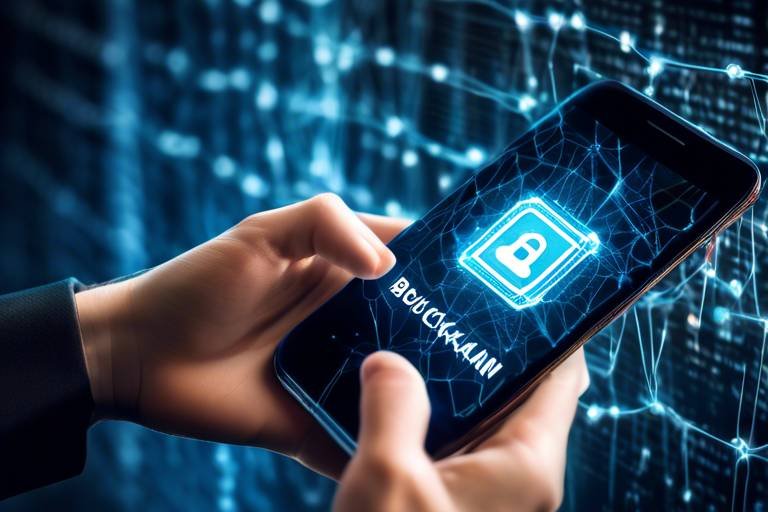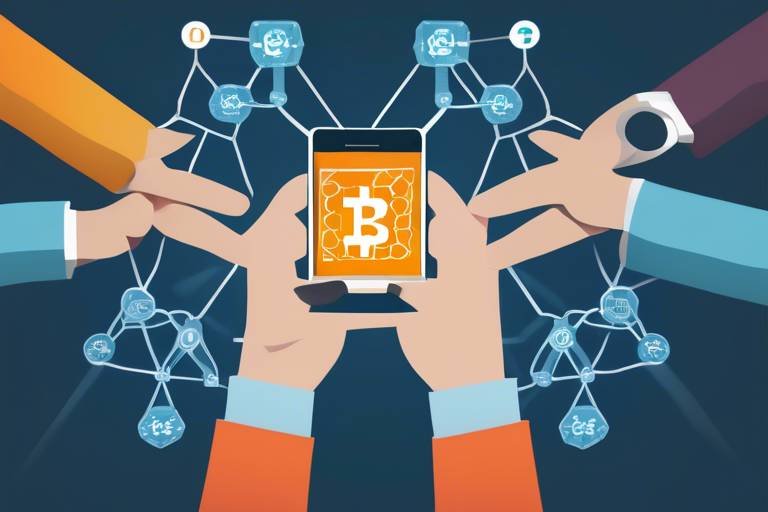How Blockchain Technology is Reshaping the Future of Work
In today's fast-paced world, where change is the only constant, blockchain technology is emerging as a game-changer in the workplace. You might be wondering, "How can a digital ledger change the way we work?" Well, the answer lies in its ability to enhance security, transparency, and efficiency across various industries. Imagine a world where your data is secure, transactions are transparent, and processes are streamlined. Sounds appealing, right? That's exactly what blockchain promises to deliver.
As we delve deeper into this topic, we'll explore how blockchain is not just a buzzword but a revolutionary technology that's reshaping the future of work as we know it. From empowering employees to transforming recruitment processes, blockchain is paving the way for a more equitable and efficient workplace. So, buckle up as we embark on this exciting journey through the fascinating world of blockchain!
Understanding the fundamental principles of blockchain technology is crucial. At its core, blockchain is a decentralized digital ledger that records transactions across multiple computers. This means that no single entity has control over the entire database, making it incredibly secure and resistant to tampering. Each block in the chain contains a number of transactions, and once a block is filled, it is added to the chain in a linear, chronological order. This process is secured through complex cryptographic algorithms, ensuring that the data remains unalterable.
But why does decentralization matter? Well, think of it as a democratic approach to data management where everyone has a say, and no one can manipulate the information for personal gain. This shift from centralized systems to decentralized networks is not just a technical upgrade; it's a fundamental change in how we think about data ownership and security in the workplace.
Decentralization is one of blockchain's core features, and it has profound implications for the workplace. By removing intermediaries, blockchain empowers users and fosters a more equitable work environment. Imagine a scenario where employees can directly interact with their employers without the need for middlemen. This not only speeds up processes but also builds a sense of trust and transparency.
Blockchain technology can empower employees by giving them more control over their data and work processes. This shift can lead to increased job satisfaction and productivity. For instance, employees can have direct access to their work records and performance data, allowing them to make informed decisions about their career paths. When employees feel in control, they are more likely to be engaged and motivated in their roles.
With blockchain, employees can own and manage their personal data. This is a significant leap forward for privacy and security in the workplace. Instead of companies having unilateral control over employee data, individuals can dictate who has access to their information. This ownership not only protects employees but also fosters a culture of trust within organizations.
Another fascinating aspect of blockchain technology is the concept of smart contracts. These are self-executing contracts with the terms of the agreement directly written into code. Imagine a scenario where a contract automatically executes once all parties fulfill their obligations. This automation reduces the need for intermediaries and streamlines workflows, ensuring compliance in various business transactions.
Transparency is vital in building trust within organizations. Blockchain fosters transparency in transactions and decision-making processes, leading to improved collaboration. When everyone has access to the same information, it minimizes misunderstandings and promotes accountability. In a world where trust can be hard to come by, blockchain offers a beacon of hope.
Blockchain technology is revolutionizing recruitment by enhancing verification processes. Gone are the days of lengthy background checks and the potential for hiring fraud. With blockchain, organizations can streamline hiring and improve candidate trustworthiness. Imagine a world where your educational and professional credentials are securely verified in a matter of seconds.
Blockchain allows for the secure verification of educational and professional credentials. This capability can significantly reduce hiring fraud and improve recruitment efficiency. Instead of relying on third-party verification services, employers can access a tamper-proof record of a candidate's qualifications directly from the blockchain. This not only saves time but also builds confidence in the hiring process.
By utilizing blockchain, organizations can minimize biases in hiring. Transparent processes can lead to more equitable hiring practices. Imagine if hiring decisions were based solely on skills and qualifications rather than personal biases. This shift could lead to a more diverse and inclusive workforce, ultimately benefiting organizations and society as a whole.
- What is blockchain technology? Blockchain is a decentralized digital ledger that records transactions across multiple computers, ensuring security and transparency.
- How does blockchain empower employees? Blockchain gives employees more control over their data and work processes, leading to increased job satisfaction and productivity.
- Can blockchain reduce hiring fraud? Yes, blockchain enables secure verification of credentials, significantly reducing the chances of hiring fraud.
- What are smart contracts? Smart contracts are self-executing contracts with the terms directly written into code, automating processes and ensuring compliance.

The Basics of Blockchain Technology
Understanding the fundamental principles of blockchain technology is crucial for grasping its transformative potential in the workplace. At its core, blockchain is essentially a decentralized digital ledger that records transactions across many computers. This means that no single entity has control over the entire chain, making it resistant to tampering and fraud. Imagine a communal notebook where everyone can see and add entries, but no one can erase what’s already been written. This is the essence of how blockchain operates.
One of the standout features of blockchain is its cryptographic security. Each transaction is secured using complex algorithms, ensuring that data remains confidential and unalterable. When a new transaction occurs, it is bundled with others into a block. This block is then added to a chain of previous blocks, hence the name "blockchain." The use of cryptography means that only those with the correct cryptographic keys can access or modify the data, which significantly enhances security.
To further illustrate how blockchain functions, consider the following key components:
- Nodes: These are individual computers that participate in the blockchain network. They validate and store transactions, ensuring that everyone has the same version of the ledger.
- Blocks: Each block contains a list of transactions, a timestamp, and a reference to the previous block, creating a continuous chain.
- Consensus Mechanisms: These are protocols that ensure all nodes agree on the validity of transactions. Common methods include Proof of Work and Proof of Stake.
This decentralized structure not only enhances security but also promotes transparency. Since every transaction is recorded on the blockchain and can be viewed by all participants, it becomes nearly impossible to manipulate data without detection. This transparency fosters trust among users and can lead to more collaborative work environments.
In summary, blockchain technology is a game-changer for various industries, providing a secure, transparent, and efficient way to manage transactions and data. As we delve deeper into its applications in the workplace, it becomes clear that understanding these basics is the first step toward leveraging blockchain's full potential.

Decentralization and Its Impact
Decentralization is the heartbeat of blockchain technology, and its impact on the workplace is nothing short of revolutionary. Imagine a world where intermediaries are no longer necessary, where transactions occur directly between parties without the need for a middleman. This shift not only simplifies processes but also fosters a sense of empowerment among users. In traditional business models, companies often rely on centralized authorities to manage transactions, oversee data, and ensure compliance. However, with blockchain, the power is distributed, allowing individuals to take control of their own work environments.
So, what does this mean for employees and organizations alike? First off, decentralization encourages a more equitable work environment. Without the constraints imposed by centralized systems, employees can interact directly with their peers and clients, leading to a more collaborative atmosphere. This is akin to a potluck dinner where everyone brings their unique dish to the table, creating a diverse and rich experience rather than relying on a single chef to prepare the meal. As a result, employees feel more valued and engaged, which can significantly boost morale and productivity.
Furthermore, decentralization enhances transparency across the board. When information is stored on a blockchain, it is accessible to all parties involved, making it nearly impossible to manipulate or hide data. This transparency builds trust within organizations, as employees can see how decisions are made and how their contributions fit into the bigger picture. For instance, if a company implements a new policy, employees can review the data and rationale behind it, fostering a culture of openness and accountability.
Additionally, decentralization empowers employees by giving them more control over their data and work processes. With traditional systems, personal data is often held by the organization, leading to concerns about privacy and security. However, blockchain allows individuals to manage their own data securely. This shift in data ownership not only enhances privacy but also instills a sense of responsibility among employees. They become active participants in safeguarding their information, which can lead to greater job satisfaction and a sense of ownership over their work.
In summary, decentralization is a game-changer in the workplace. By removing intermediaries, it empowers employees, enhances transparency, and fosters collaboration. As organizations continue to embrace blockchain technology, the traditional hierarchies that have long defined the workplace are likely to evolve into more democratic and equitable structures. This transformation not only benefits employees but also paves the way for more innovative and agile organizations that can adapt to the ever-changing business landscape.
- What is decentralization in blockchain? Decentralization refers to the distribution of control and authority away from a central entity, allowing users to interact directly with one another.
- How does decentralization benefit employees? It empowers employees by giving them more control over their data and work processes, leading to increased job satisfaction and collaboration.
- Can decentralization improve transparency in organizations? Yes, it fosters transparency by making information accessible to all parties, reducing the potential for manipulation or hidden agendas.
- What impact does decentralization have on workplace culture? It promotes a more equitable and collaborative culture, where employees feel valued and engaged in decision-making processes.

Empowering Employees
In today's fast-paced work environment, the notion of empowerment has taken on a whole new meaning, especially with the advent of blockchain technology. Imagine a workplace where employees have complete control over their data and processes—sounds like a dream, right? Well, with blockchain, this dream is becoming a reality. By decentralizing data management and allowing individuals to own their information, blockchain is fundamentally changing the dynamics of power within organizations.
One of the most exciting aspects of this technology is its ability to enhance job satisfaction. When employees feel they have a say in how their data is used and shared, they are more likely to be engaged and motivated. This empowerment leads to a more productive workforce. Think of it as giving employees the keys to their own kingdom. Instead of being at the mercy of corporate policies that often feel arbitrary and opaque, they can navigate their own paths. This shift not only boosts morale but also enhances overall productivity. When people feel valued and in control, they naturally perform better.
Moreover, blockchain introduces the concept of data ownership. This means that employees can manage their personal data without relying on third parties. For instance, if an employee wants to share their credentials with a potential employer, they can do so securely and directly, without the risk of their information being tampered with. This level of control can significantly enhance privacy and security in the workplace, making employees feel safer about how their data is handled. It's akin to having a personal vault where only they hold the keys.
Another way blockchain empowers employees is through the use of smart contracts. These digital contracts automate processes and eliminate the need for intermediaries, which can often slow down workflows. For example, imagine a scenario where an employee completes a task and is automatically compensated without waiting for managerial approval. This not only speeds up processes but also fosters a sense of trust and reliability. Employees can focus more on their work rather than the bureaucratic hurdles that often come with traditional workflows.
In summary, the empowerment of employees through blockchain technology is not just a buzzword—it's a transformative shift that can lead to a more equitable and efficient workplace. By giving employees control over their data, enhancing job satisfaction, and streamlining processes, blockchain is paving the way for a new era of work where everyone has a stake in their success.
- What is blockchain technology? Blockchain is a decentralized digital ledger that records transactions across multiple computers in a way that the registered transactions cannot be altered retroactively.
- How does blockchain empower employees? It empowers employees by giving them control over their personal data, enhancing job satisfaction, and streamlining processes through smart contracts.
- What are smart contracts? Smart contracts are self-executing contracts with the terms of the agreement directly written into code, allowing for automated and secure transactions.
- Can blockchain enhance job security? Yes, by providing transparency and trust in data management, blockchain can enhance job security and employee confidence.

Data Ownership
In today's digital age, data is often referred to as the new oil, and for good reason. With the rise of blockchain technology, the concept of is undergoing a significant transformation. Imagine a world where you, as an employee, have complete control over your personal data—no more worrying about who has access to it or how it’s being used. Blockchain empowers individuals by allowing them to manage and own their data securely and transparently. This shift not only enhances privacy but also instills a sense of security among employees, knowing that their information is protected by cryptographic measures.
One of the most compelling aspects of data ownership is the ability to grant and revoke access to your information. On a blockchain, you can choose who sees your data and when they see it. This is particularly crucial in the workplace, where sensitive information about your qualifications, experience, and performance is often shared with various stakeholders. With traditional systems, once your data is out there, it's hard to control its flow. However, with blockchain, you can maintain a level of control that was previously unimaginable.
Moreover, this ownership extends to the verification of credentials. With blockchain, your educational and professional achievements can be securely stored and easily verified by potential employers. This means that you can present a tamper-proof record of your qualifications, which not only boosts your credibility but also reduces the chances of hiring fraud. In a time when misinformation is rampant, having a reliable way to showcase your skills is invaluable.
Additionally, the implications of data ownership go beyond just personal benefits. Organizations can also reap significant rewards. By ensuring that employees have control over their data, companies can foster a culture of trust and transparency. This leads to improved morale and productivity, as employees feel more secure in their work environment. When individuals know they have ownership of their data, they are more likely to engage fully in their roles, contributing to a more dynamic and innovative workplace.
In summary, the concept of data ownership in the context of blockchain technology is revolutionary. It not only empowers employees by giving them control over their personal information but also enhances organizational trust and efficiency. As we continue to embrace this technology, the workplace will undoubtedly become a more equitable and secure environment for everyone involved.
- What is data ownership in blockchain? Data ownership in blockchain refers to the ability of individuals to control and manage their personal data securely, granting access only to those they choose.
- How does blockchain enhance data security? Blockchain uses cryptographic techniques to secure data, making it nearly impossible for unauthorized parties to access or alter information.
- Can blockchain help reduce hiring fraud? Yes, by securely storing and verifying credentials on a blockchain, it minimizes the risk of hiring fraud and ensures that candidates' qualifications are accurate.
- What are the benefits of data ownership for organizations? Organizations that promote data ownership can foster trust, transparency, and higher employee engagement, leading to improved productivity and morale.

Smart Contracts
Smart contracts are one of the most exciting innovations brought about by blockchain technology. Imagine a contract that automatically executes itself when certain conditions are met—no lawyers, no middlemen, just pure, unadulterated efficiency. These digital contracts are essentially self-executing agreements with the terms of the agreement directly written into code. This means that once the contract is deployed on the blockchain, it runs autonomously, ensuring that all parties adhere to the agreed-upon terms without the need for external enforcement.
The implications of smart contracts are vast and transformative. For businesses, they can significantly reduce operational costs and time delays associated with traditional contract management. By automating processes, organizations can streamline workflows and focus on what truly matters—growing their business. For instance, consider a scenario where a company hires a freelancer for a project. Traditionally, this would involve back-and-forth negotiations, signing documents, and waiting for payments to clear. With smart contracts, once the freelancer completes the project and submits their work, the payment is automatically released upon verification, all without human intervention.
Moreover, smart contracts enhance compliance and security. Since they operate on a decentralized network, tampering with a smart contract is nearly impossible. This ensures that all transactions are secure and transparent, fostering a level of trust that is often lacking in traditional business dealings. When all parties can see the same information and have confidence that it cannot be altered, the potential for disputes diminishes significantly.
Let's break down some key benefits of smart contracts:
- Cost Efficiency: By eliminating intermediaries, businesses can save money on transaction fees and administrative costs.
- Speed: Automated processes mean faster execution of contracts, allowing for quicker project turnarounds.
- Accuracy: Reducing the human element minimizes errors in contract execution, ensuring that all terms are met as intended.
- Transparency: All parties have access to the same data, which helps build trust and accountability.
As we move forward, the adoption of smart contracts is likely to grow, especially in sectors like real estate, finance, and supply chain management. In real estate, for example, smart contracts can streamline the buying and selling process by automatically transferring ownership once payment is made. In finance, they can facilitate complex transactions like derivatives trading without the need for a central clearinghouse. The possibilities are endless!
In conclusion, smart contracts are not just a technological trend; they represent a fundamental shift in how we approach agreements and transactions in the workplace. By leveraging their power, businesses can unlock new levels of efficiency, trust, and innovation, paving the way for a more streamlined future.
What are smart contracts?
Smart contracts are self-executing contracts with the terms of the agreement directly written into code, allowing them to automatically enforce and execute agreements without intermediaries.
How do smart contracts work?
Smart contracts operate on blockchain technology, executing automatically when predetermined conditions are met, ensuring transparency and reducing the risk of fraud.
What industries can benefit from smart contracts?
Industries such as real estate, finance, supply chain management, and healthcare can significantly benefit from the efficiency and security that smart contracts offer.
Are smart contracts secure?
Yes, smart contracts are highly secure due to the decentralized nature of blockchain technology, making it extremely difficult to alter or tamper with them.
Can smart contracts be modified after deployment?
Once deployed, smart contracts cannot be changed, which is why it's essential to ensure that all terms are correct before execution.

Enhancing Transparency
In today's fast-paced work environment, transparency is more than just a buzzword; it's a fundamental pillar that supports trust within organizations. Imagine a workplace where everyone has access to the same information, where decisions are made openly, and where every transaction is recorded in an immutable ledger. This is the reality that blockchain technology promises to deliver. By leveraging its unique features, businesses can foster an atmosphere of trust and collaboration, ultimately leading to higher employee morale and productivity.
Blockchain enhances transparency by providing a decentralized ledger that anyone within the network can access. This means that all transactions, whether they involve financial exchanges, contract agreements, or project updates, are recorded in real-time. For instance, if a company uses blockchain to track project milestones, every team member can see the progress without having to rely on a manager's report. This level of visibility not only keeps everyone on the same page but also encourages accountability among team members.
Moreover, the cryptographic security that underpins blockchain ensures that once a transaction is recorded, it cannot be altered or deleted. This characteristic is crucial for maintaining the integrity of information. In traditional systems, data manipulation can lead to mistrust and conflicts. However, with blockchain, employees can be confident that the information they see is accurate and trustworthy. Imagine the peace of mind that comes from knowing that your company’s records are secure and transparent!
Another exciting aspect of blockchain is its ability to streamline decision-making processes. When all stakeholders have access to the same information, it becomes easier to make informed decisions quickly. For example, in a scenario where a team needs to approve a budget, they can all view the necessary documents and transaction history on the blockchain. This eliminates the cumbersome back-and-forth emails and meetings typically required to gather information, allowing for a more efficient workflow.
Furthermore, the transparency offered by blockchain extends beyond internal operations; it also impacts external relationships. Clients and partners can have visibility into the processes that affect them, fostering trust and collaboration. By being open about the way business is conducted, organizations can build stronger relationships with their stakeholders. For instance, a supply chain company that uses blockchain can provide real-time updates to customers about the status of their orders, thereby enhancing customer satisfaction.
In conclusion, the enhanced transparency brought about by blockchain technology is a game-changer for organizations. It not only cultivates trust and accountability among employees but also strengthens relationships with external stakeholders. As businesses continue to adopt this technology, we can expect to see a shift towards more open and collaborative work environments, where everyone has a stake in the success of the organization.
- What is blockchain technology? Blockchain is a decentralized digital ledger that records transactions across many computers in such a way that the registered transactions cannot be altered retroactively.
- How does blockchain enhance transparency? Blockchain enhances transparency by allowing all participants in a network to access the same data, ensuring that all transactions are visible and immutable.
- Can blockchain reduce fraud? Yes, the immutable nature of blockchain records makes it nearly impossible to alter data without detection, significantly reducing the potential for fraud.
- How can blockchain improve employee satisfaction? By empowering employees with control over their data and providing a transparent work environment, blockchain can lead to greater job satisfaction and productivity.

Blockchain in Recruitment and Hiring
In today's fast-paced job market, finding the right candidates can feel like searching for a needle in a haystack. Traditional recruitment processes often involve lengthy verification of credentials, which can lead to delays and increased costs. Enter blockchain technology, a game-changer that is revolutionizing how we approach hiring and recruitment. By leveraging the power of decentralized systems, organizations can streamline their hiring processes while ensuring a higher level of trust and security.
One of the most significant advantages of blockchain in recruitment is its ability to enhance the verification of candidates' credentials. In a world where resumes can be easily manipulated, blockchain provides a secure and immutable way to verify educational and professional qualifications. Imagine a scenario where your degree, certifications, and work history are all stored on a blockchain. Employers can instantly access this information, knowing that it is tamper-proof and accurate. This not only saves time but also reduces the risk of hiring fraud, which can cost companies dearly.
Moreover, blockchain technology can help eliminate biases in the hiring process. Traditional recruitment methods often unintentionally favor certain demographics over others, leading to a lack of diversity in the workplace. With blockchain, the hiring process can be made more transparent. For instance, if candidate evaluations are recorded on a blockchain, it becomes easier to track and analyze the decision-making process. This transparency can help organizations make more equitable hiring decisions, ensuring that candidates are evaluated based on their skills and qualifications rather than their background.
To illustrate the potential impact of blockchain on recruitment, let's take a look at a few key benefits:
- Faster Hiring Processes: With quick access to verified credentials, employers can make hiring decisions faster, reducing the time-to-hire.
- Increased Trust: Candidates can feel more secure knowing that their information is protected and that employers are using a reliable verification process.
- Cost Efficiency: By reducing the need for extensive background checks and third-party verification services, organizations can save money in the recruitment process.
Furthermore, the implementation of smart contracts in recruitment can automate various stages of the hiring process. For example, once a candidate accepts an offer, a smart contract can automatically trigger the onboarding process, including document submissions and background checks. This not only speeds up the process but also ensures that all necessary steps are completed without human error.
As we continue to explore the potential of blockchain technology in recruitment and hiring, it's clear that it offers a path toward a more efficient, equitable, and trustworthy hiring process. Companies that embrace this technology will not only improve their operational efficiency but will also enhance their reputation as forward-thinking employers. In a world where talent is the most valuable asset, leveraging blockchain could very well be the key to attracting and retaining top-notch candidates.
Q1: How does blockchain improve the recruitment process?
A1: Blockchain improves the recruitment process by providing secure and verifiable credentials, reducing hiring fraud, and streamlining the verification process.
Q2: Can blockchain help in reducing bias in hiring?
A2: Yes, blockchain can enhance transparency in hiring decisions, making it easier for organizations to evaluate candidates based on skills rather than demographic factors.
Q3: What are smart contracts, and how do they apply to hiring?
A3: Smart contracts are self-executing contracts with the terms of the agreement directly written into code. In hiring, they can automate processes like onboarding and background checks.
Q4: Is blockchain technology expensive to implement in recruitment?
A4: While there may be initial costs associated with implementing blockchain technology, the long-term savings from increased efficiency and reduced fraud can outweigh these costs.

Verifying Credentials
In today's fast-paced job market, ensuring the authenticity of a candidate's credentials has become more critical than ever. With the rise of blockchain technology, the process of verifying educational and professional qualifications is undergoing a significant transformation. Imagine a world where employers can instantly access verified records of a candidate's degrees, certifications, and work experience without the hassle of traditional background checks. This is not just a dream; it's becoming a reality thanks to blockchain.
Blockchain provides a secure and immutable way to store and share credential information. Each credential is recorded on a distributed ledger that is accessible to authorized parties, ensuring that the information is tamper-proof. This means that once a degree or certification is issued, it cannot be altered or forged. Employers can have peace of mind knowing that the data they are reviewing is accurate and reliable. With the click of a button, they can verify a candidate's educational background or professional certifications, saving valuable time and resources.
Moreover, the decentralized nature of blockchain eliminates the need for third-party verification services, which can often be slow and costly. Instead, organizations can directly access the information they need, making the hiring process more efficient. Imagine cutting down the time spent on background checks from weeks to mere minutes! This efficiency not only speeds up the recruitment process but also enhances the candidate experience, as applicants no longer have to wait anxiously for their qualifications to be verified.
Another significant advantage of blockchain in credential verification is the reduction of hiring fraud. According to a study by the Association of Certified Fraud Examiners, hiring fraud costs companies billions each year. By utilizing blockchain technology, organizations can significantly lower the risk of hiring individuals with falsified credentials. With a transparent system where all stakeholders can verify information, the chances of encountering fraudulent resumes are drastically reduced.
In addition to improving efficiency and reducing fraud, blockchain technology promotes a more inclusive hiring process. By ensuring that credential verification is accessible and straightforward, organizations can focus on the skills and qualifications of candidates rather than their backgrounds. This can lead to a more diverse workforce, as hiring managers are less likely to be swayed by biases related to educational institutions or previous employers.
To illustrate the impact of blockchain on credential verification, consider the following table:
| Traditional Verification | Blockchain Verification |
|---|---|
| Time-consuming process | Instant access to verified credentials |
| High risk of fraud | Immutable and secure records |
| Dependence on third parties | Direct access for employers |
| Potential for bias | Transparent and equitable verification |
In conclusion, blockchain technology is revolutionizing the way we verify credentials in the hiring process. By providing a secure, efficient, and transparent method for credential verification, it not only enhances the integrity of the recruitment process but also empowers organizations to make informed hiring decisions. As this technology continues to evolve, we can expect to see even more innovative applications that will further transform the workplace.
Q1: How does blockchain technology prevent credential fraud?
A1: Blockchain technology creates an immutable record of credentials that cannot be altered or forged. This ensures that employers can trust the information they receive.
Q2: What are the benefits of using blockchain for credential verification?
A2: The benefits include faster verification processes, reduced hiring fraud, lower costs, and a more equitable hiring landscape.
Q3: Can blockchain technology be used for all types of credentials?
A3: Yes, blockchain can be used to verify various types of credentials, including educational degrees, professional certifications, and work experience.

Reducing Bias in Hiring
In the ever-evolving landscape of recruitment, bias has long been a silent killer of potential talent. Traditional hiring practices often rely on subjective judgments, which can inadvertently lead to unfair advantages or disadvantages based on a candidate's background, gender, or even appearance. However, blockchain technology is emerging as a game changer, offering a pathway to a more equitable hiring process. Imagine a world where every candidate is evaluated based on their skills and qualifications alone—sounds appealing, right?
With blockchain, organizations can create a transparent and immutable record of candidates' qualifications, experiences, and skills. This digital ledger allows employers to verify credentials in real-time, ensuring that what they see is exactly what they get. By eliminating the ambiguity often associated with resumes, blockchain can significantly reduce the potential for bias. For instance, if a hiring manager can see a verified history of a candidate's achievements rather than just a self-reported narrative, it levels the playing field.
Moreover, the transparency that blockchain provides can help organizations implement standardized hiring criteria. When all candidates are assessed against the same benchmarks, it becomes much harder to let personal biases creep into the decision-making process. This is particularly important in industries where diversity and inclusion are paramount. By utilizing blockchain, companies can ensure that their hiring practices are not only fair but also aligned with their values of equity and representation.
But how does this actually work in practice? Let's break it down:
- Anonymous Applications: Candidates can submit applications without revealing personal information that could lead to bias, such as name, gender, or ethnicity.
- Verified Skills: Blockchain can store verifiable credentials, allowing employers to focus solely on a candidate's qualifications.
- Data-Driven Decisions: By analyzing data from blockchain records, companies can identify patterns in hiring that may indicate bias, allowing them to adjust their strategies accordingly.
In essence, blockchain not only enhances the efficiency of hiring processes but also promotes a culture of fairness and respect. As organizations increasingly recognize the importance of diversity, leveraging blockchain technology can be a crucial step toward achieving truly inclusive hiring practices.
As we move forward, it’s clear that the integration of blockchain into recruitment is not just a trend but a necessary evolution. By embracing this technology, companies can not only reduce bias but also foster a more innovative and diverse workforce. And in a world where creativity and collaboration are key to success, isn’t that exactly what we need?
- What is blockchain technology? Blockchain is a decentralized digital ledger that securely records transactions across many computers, ensuring that the data cannot be altered retroactively.
- How does blockchain reduce bias in hiring? By providing a transparent and verifiable record of candidates' qualifications, blockchain minimizes subjective judgments that can lead to bias.
- Can blockchain improve diversity in the workplace? Yes, by implementing standardized and anonymous hiring processes, blockchain can help organizations achieve a more diverse and inclusive workforce.
Frequently Asked Questions
- What is blockchain technology?
Blockchain technology is a decentralized digital ledger that records transactions across multiple computers in a way that the registered transactions cannot be altered retroactively. This ensures transparency and security, making it a game-changer for various industries.
- How does blockchain enhance workplace security?
Blockchain enhances workplace security by utilizing cryptographic techniques that protect data integrity and prevent unauthorized access. This means sensitive information remains safe, reducing the risk of data breaches and fraud.
- What are smart contracts, and how do they work?
Smart contracts are self-executing contracts with the terms of the agreement directly written into code. They automatically enforce and execute the terms when certain conditions are met, eliminating the need for intermediaries and streamlining processes.
- Can blockchain technology empower employees?
Absolutely! Blockchain empowers employees by giving them control over their personal data and work processes. This increased autonomy can lead to higher job satisfaction and productivity, as employees feel more valued and trusted.
- How does blockchain improve recruitment processes?
Blockchain improves recruitment by enabling secure verification of candidates' credentials, such as education and work history. This reduces hiring fraud and helps employers make informed decisions, leading to a more trustworthy hiring process.
- In what ways can blockchain reduce bias in hiring?
By providing transparent and verifiable data about candidates, blockchain minimizes biases in hiring. It ensures that hiring decisions are based on merit rather than subjective factors, promoting a more equitable workplace.
- What industries can benefit from blockchain technology?
Many industries can benefit from blockchain technology, including finance, healthcare, supply chain management, and human resources. Its versatility allows for improved security, transparency, and efficiency across various sectors.
- Is blockchain technology easy to implement in existing systems?
The ease of implementing blockchain technology depends on the specific use case and existing infrastructure. While it may require some adjustments and training, the long-term benefits often outweigh the initial challenges.



















